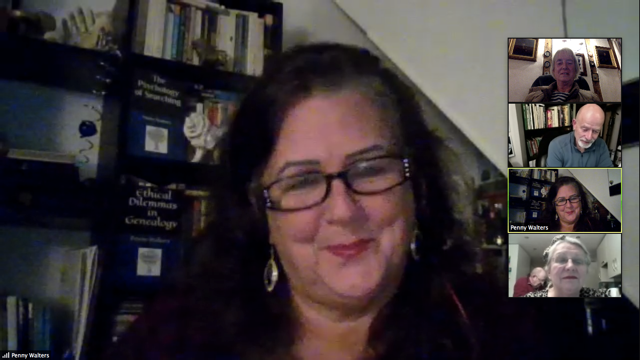- Screen Colours:
- Normal
- Black & Yellow

Dissecting UK Censuses, 1801-present
Continuing with our programme of Zoom-based member events, we welcomed Dr Penny Walters to our November meeting.
Penny is a much respected writer and public speaker, particularly on genetic DNA, adoption, and moral dilemmas encountered during family-history research. However, on this occasion, she took us on an engaging and enlightening journey through the decennial National Censuses of England and Wales, also touching on the distinct returns compiled in Scotland and Ireland.
The 35-strong online audience was first given valuable insight into the content of each survey, and how census information can be used in conjunction with civil registration records of birth, marriage and death to streamline research efforts. Penny then highlighted a range of other useful techniques, including the value of plotting a census enumerator’s route to help locate historic ancestral addresses, and the use of maps in parallel with census content to identify socio-economic conditions in a discrete geographical area.
Finally, we learned about some interesting Victorian occupations, the detail to be found in the 1939 National Register and, tellingly, the planned publication dates of future censuses under the 100-year closure rule. In this respect, the 1921 Census, scheduled for release by the subscription service Find My Past in the early months of 1922, will no doubt cause something of a feeding frenzy amongst the genealogical community.
A lively question-and-answer session at the end of Penny’s talk was a testament to the attendees’ enthusiasm for her presentation, enhanced by a comprehensive and informative handout.
Chris Broom
 |
 |
|
| Dr Penny Walters talking to us on Zoom | Charles Darwin's entry (on the fourth row) |
DISSECTING THE DOCUMENTS: UK CENSUSES, 1801 TO THE PRESENT
—
The speaker for this evening's ONLINE talk is Penny Walters, a member of staff at the University of Bristol, who lectures internationally, and writes articles about a variety of genealogy topics, including as author of several books.
This session will look at the evolution of decennial censuses in the UK. The first census was taken in 1801, but it wasn’t until 1841 that details about named individuals was collected. We will look at each census in turn, deconstructing the information that is available, revealing tips and hints for lateral thinking, which give clues for further research. It will also show how the census forms are organized, and reveal known problems with specific years. We will also look at what could be considered census substitutes, such as the 1939 Register, because there was no census taken in 1941 due to World War II. Looking at censuses against a backdrop of social history is vital, and an overview of social, political and economic landscapes will be given, with key dates. Some quirky examples will also be given, such as the Suffragettes filling in the 1911 Census, and people who included their opinions on the forms.
Dr. Penny Walters has been a University lecturer for thirty years in Psychology and Business Studies. Penny’s interest in genealogy started after having her first child and then wondering about her biological parents, as she was adopted. Penny lectures internationally in-person, presents webinars, and writes articles about a variety of genealogy topics including ethical dilemmas, the psychology of searching, ethnicity and identity, adoption, and Irish heritage.
Penny's talk will be held over Zoom, and is limited to paid-up members.